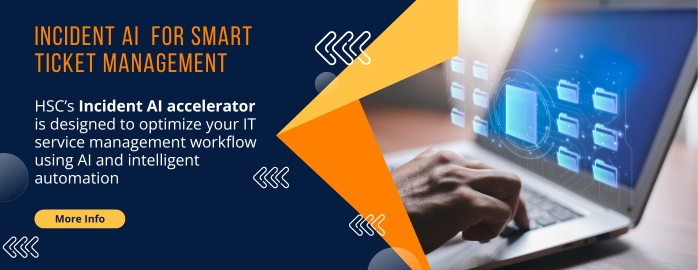The traditional ticket management systems used to be labour-intensive and handled manually. IT service desk agents were overloaded with high volumes of tickets that required manual ticket categorization, prioritization, assignment, and resolution. Agents would review and prioritize tickets based on their judgment and available information. Communication between agents and users happened through emails or phone calls, sometimes leading to miscommunication.
The manual approach was time-consuming, led to delays in ticket resolution and increased workload on agents. The process was prone to errors with no real-time updates on ticket status leading to inefficiencies.
With emerging technologies, companies started moving away from the traditional approach and incorporated cloud-based solutions. Easy ticket access to support remote teams and basic automation features with cloud made ticket management simpler for IT agents.
While cloud-based solutions did improve the efficiency of the system, but automation was limited. Manual intervention was still required for many tasks like categorizing and prioritizing tickets.
As technology is advancing, artificial intelligence is being integrated into all solutions to automate and streamline processes. To enable ITSM automation, AI was integrated with ticket management systems as well.
These AI service management systems can automate the routine tasks of IT service desk agents. They can automatically categorize and route tickets to the appropriate support agent based on workload and expertise. AI can also aid in prioritizing tickets by identifying trends in ticket data. This can be used to predict which tickets are likely to cause high-impact and require immediate attention. Moreover, it analyses historical data and offers personalized solutions to prevent recurring issues. This allows IT service desk agents to focus on more complex and strategic issues.
HSC’s accelerator, Incident AI, is an AI-powered solution developed to streamline ticket management and aid to ITSM automation. It includes AI-powered ticket clustering, which groups similar issues together, thereby reducing the volume of tickets. Historical data analysis provides customized solutions using the resolution recommendation engine of Incident AI. Incident AI, along with predictive analytics, predicts potential future tickets and takes proactive preventive steps. Moreover, integrating Copilot or other AI chatbot assistants results in an interactive chatbot capable of comprehending issues and offering resolutions. The integration of AI service management further enables intelligent automation, thereby optimizing IT service management workflows.

Incident AI can automate routine processes like resetting passwords and unlocking accounts, reducing the burden on IT service desk agents.
Incident AI’s ticket clustering feature can streamline IT service desk operations by grouping similar tickets together. This enables support teams to resolve multiple issues at once and offer a comprehensive view of underlying problems. As a result, there is a reduction in clutter in the ticketing system caused by the high volume of tickets.
Incident AI can allow customers to make use of self-service portals and resolve issues on their own. This can improve efficiency and save time.
Incident AI can analyze tickets, automatically categorize, and route them to the appropriate IT service desk agent, ensuring faster resolution. Some tickets need immediate resolution as it could be hampering the business processes. AI can identify these urgent tickets and assign them with higher priority. Manual method worked on self-judgement which could lead to missing such severe issues.
Incident AI can detect potential issues beforehand, allowing IT service desk agents to take proactive measures and prevent downtime.
Incident AI can allow real-time monitoring of the IT landscape. This will ensure IT teams take immediate action in case of any performance bottlenecks within the infrastructure and prevent disruptions.
Incident AI can generate performance analytics and reports for IT service operations. It provides insights into ticket volumes, resolution times, and customer satisfaction levels. This data can identify trends and improve overall efficiency.
Integrating Incident AI with the existing systems includes these key steps –
ITSM automation can handle the digitization of regular tasks and repetitive issues. It efficiently sorts and routes tickets to the appropriate agents based on expertise, availability, and capacity. This allows IT service agents to focus on complex issues requiring human touch leading to increased productivity.
Incident AI facilitates the use of chatbots to handle ticket surge and serve customers round the clock. This leads to hiring fewer agents and reducing the overall cost. Phone channels are expensive compared to digital channels because agents can only serve one customer at a time. However, through AI service management, agents can serve multiple customers simultaneously leading to low operational costs.
As per a Zendesk Customer Experience Trends Report, 51% of consumers prefer interacting with chatbots over humans for immediate assistance. With routing of tickets using Incident AI, customer requests are quickly assigned to the agents leading to faster response times. This quick and effective service can result in higher customer satisfaction.
Incident AI can forecast future ticket volumes and provide real-time insights. This enables the decision-makers to make data-driven decisions and reallocate resources to optimize customer support. With AI forecasting, businesses can accurately predict staffing needs and offer real-time visibility into agent activity. This helps in optimizing support operations for scalability.
The ticket management system is constantly evolving and with integration of Incident AI, the scope widens. Augmented Reality (AR) integration with Incident AI for remote troubleshooting represents a paradigm shift in IT support. With AR-enabled devices, technicians can virtually view the user’s environment, offering instant visual guidance and instructions. This experience improves communication and accelerates the resolution of hardware-related issues. This will lead to higher levels of user satisfaction, setting a new standard for ITSM automation in the digital age.
The ticket management system has evolved from a manual process to an AI-powered system, transforming the efficiency of IT service. Incident AI enables organizations to automate routine tasks and free up IT service agents to focus on more strategic activities. While there are certain challenges such as data privacy concerns, the benefits are overpowering. As AI technology continues to advance, the future of ITSM automation holds greater potential. Further automation of complex tasks and deeper integration with other IT systems will lead to more personalized IT support.